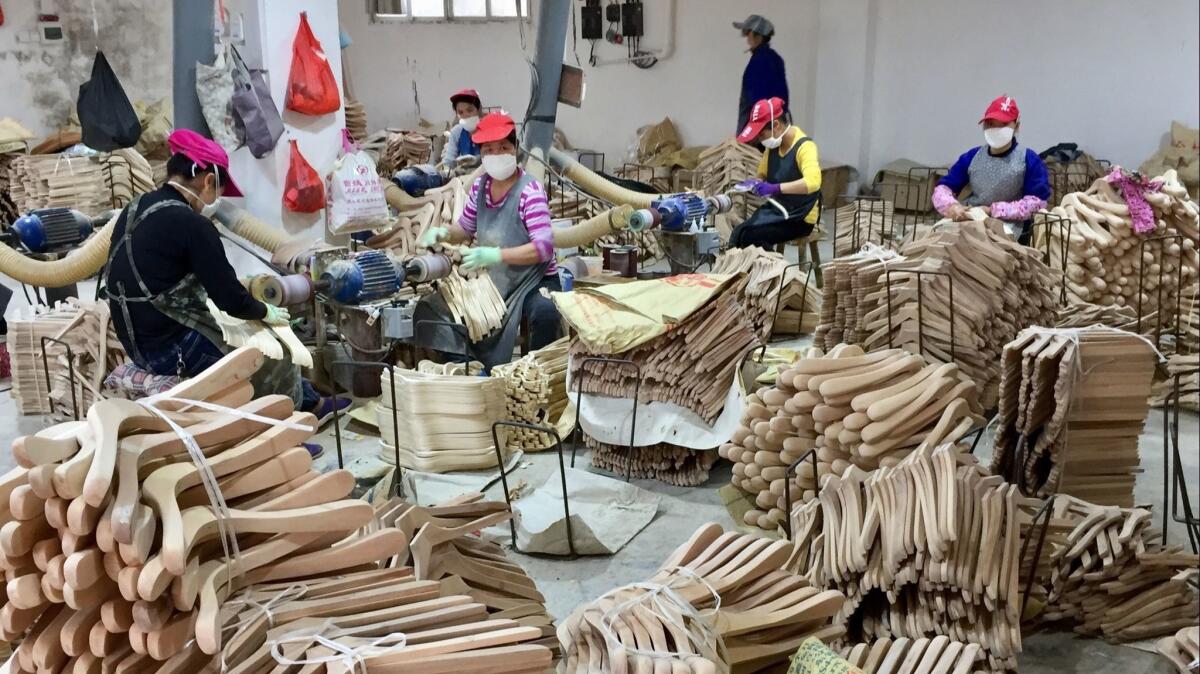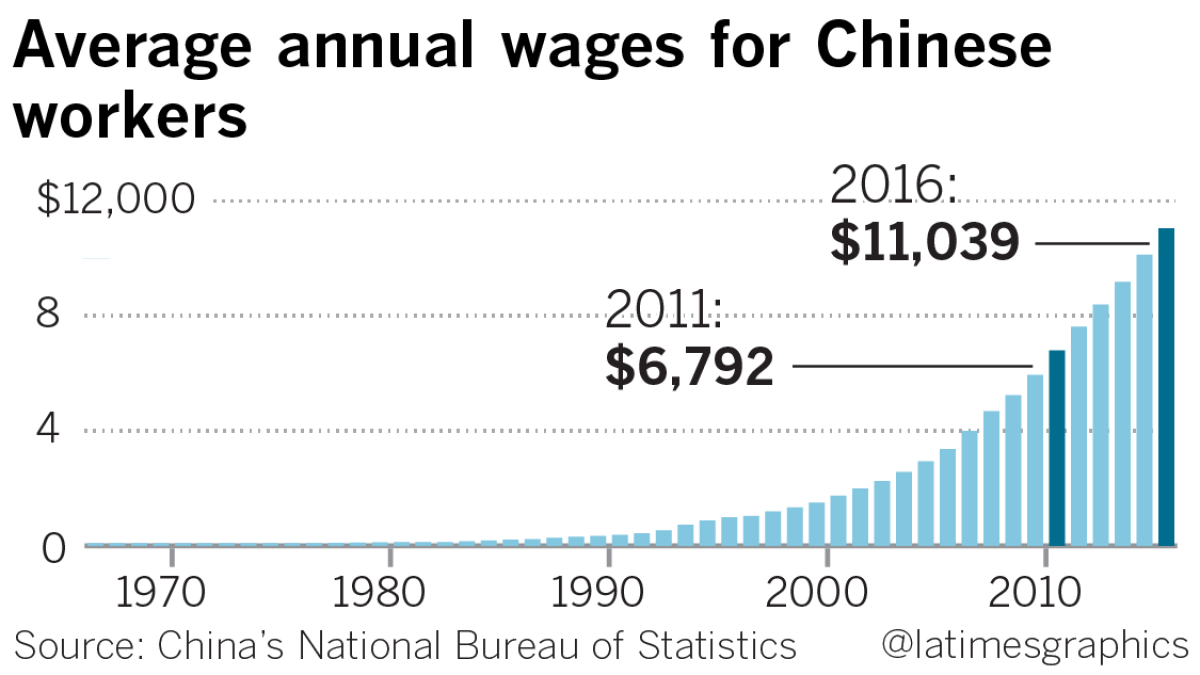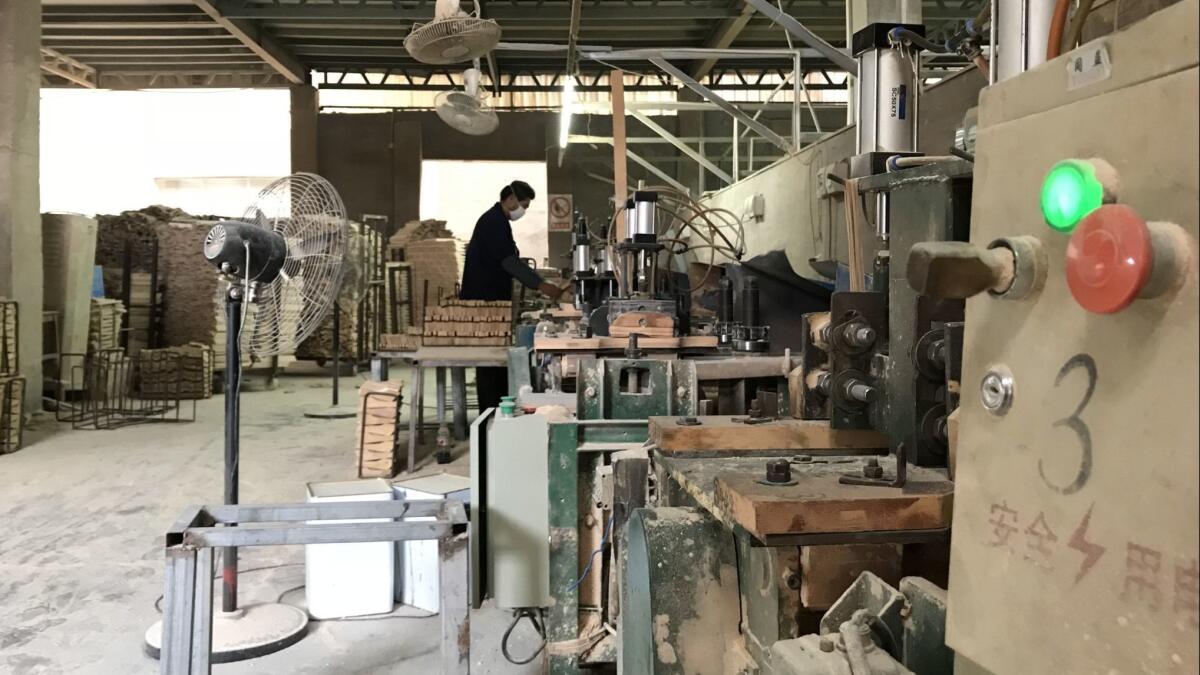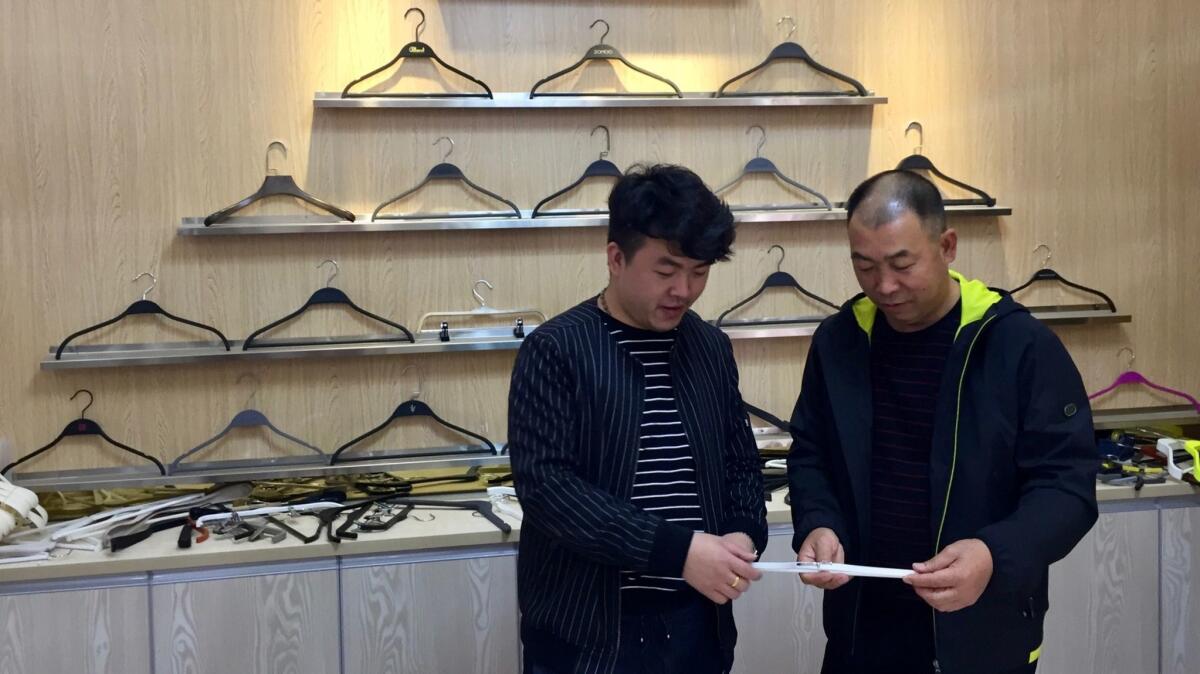A victim of its own industrial success, China’s hanger capital is now just hanging on

- Share via
Reporting from Lipu, China — Many of the world’s clothes hangers originate in two-story warehouses on the road to Lipu, a steamy town in southern China where the river flows between towering karst formations and vendors sell the sweetest taro.
Lights strung along the promenade form shapes of the town’s lifeblood. Residents take pride in the smooth wooden products that ship to Target and Ikea from “China’s hanger capital.” But scribbled help-wanted signs on its factory doors hint at a new reality.
China became the world’s manufacturer because it offered cheap, plentiful labor and a ready supply chain. In Lipu, workers produced billions of hangers that filled closets from Savannah, Ga., to Stockholm. These same factories now struggle to find employees, as wages rise and the population grays. China’s attempt to combat the shortage lies at the center of the trade tensions with Washington.
President Xi Jinping has embraced a $300-billion strategy, known as Made in China 2025, meant to accelerate the nation’s transition to advanced manufacturing in areas such as robotics and aerospace. The Trump administration perceives it as a plot to dominate the world’s most crucial technologies. Caught in between are the traditional industries China once depended on for growth.
“This year we’ve struggled the most,” said Liu Xiangmin, who runs a small hanger factory that smells of fresh wood. He lost 30% of his workforce in February after the Chinese New Year holiday. “We can’t even think about making a profit.”
A cluster of women sat on stools upstairs, sorting hangers as the factory saws droned. They wore masks to ward against the sprays of dust coughed up by the drilling machines. For their efforts, the workers receive about $7,600 a year.
The threat of U.S. tariffs doesn’t concern Liu as much as keeping his factory afloat does. China faces a conundrum of its own industrial success. The country’s thriving economy has led to higher wages, which makes labor-intensive products such as toys and shoes more costly on the international market.

China’s average annual wages rose nearly 63% between 2011 and 2016, according to the National Bureau of Statistics. Hourly income for factory workers hit $3.60 in 2016, data from the market research firm Euromonitor shows, higher than Brazil or Mexico and similar to Portugal or South Africa.
“What China wants to do, and what business owners need to do, is this kind of upgrade and transformation … so they can catch up with the rising cost of workers,” said Ashley Qian Wan, an economist at Bloomberg Economics in Beijing, who researches provincial-level markets. “China 2025 is kind of a solution for this.”
Not only do factories need to pay their workers more, but they’re also running out of people to hire. The country’s one-child policy, which lasted for more than three decades, means there aren’t enough young people to replace an aging population. Last year, China had an available workforce of 900 million people. The government predicts it will drop by 200 million by 2030.
“The whole chain is broken because we don’t have a younger generation to continue it,” said Xie Hua, who runs Huateng Hanger Co. in Lipu. A handful of workers packaged black and white plastic hangers in a warehouse near the showroom. None looked younger than 35.
The 100 or so hanger companies in Lipu accounted for 70% of China’s total output last year, according to county data. Nearly all shipped abroad to Europe, the U.S. and elsewhere. Local officials declined to comment.
The labor shortage started in coastal regions about a decade ago and then crept inward to less developed areas. Lipu has tried to diversify. Its residents grow mandarins in the hills outside town and a food processing plant makes packaged snacks. Factory bosses talk about joining the transition to automation and more advanced technologies.

It’s that transformation that scares the Trump administration. Officials worry American companies wouldn’t be able to compete against Chinese businesses backed by huge government subsidies. The White House’s proposed tariffs on $50 billion in Chinese goods target technical products, such as medical devices and automobiles.
“These are things that if China dominates the world, it’s bad for America,” U.S. Trade Representative Robert Lighthizer told a Senate committee in March.
The White House appears less concerned about low-tech items, although officials are exploring levies on an additional $100 billion in goods. And hangers have been caught in trade’s crosshairs before. U.S. officials in 2008 accused China of dumping wire hangers into the marketplace and pricing out domestic companies. But the tariffs ended up affecting American dry cleaning firms and, ultimately, the clients who wanted pressed pants or clean shirts.
“I have concerns, sure,” said Qin Yuangao, whose father started the first hanger factory in town. “But who will pay the price? American consumers. I feel sorry for them.”
The generation that turned China into the world’s factory left the small villages several decades ago for growing metropolises southeast of Guangxi province, where Lipu is located. The experience earned its own name: chuqu, or to “go out.” Migrants worked 14-hour days in dark, dirty factories. But they were making money, and that meant upward mobility.
The generation that will lead China’s next economic transformation is more likely to have completed high school, if not college. Between 2011 and 2016 alone, graduates in the country’s technical fields increased 18%, according to Euromonitor. More than money, they care about quality of life.

Dai Hongshun manages Mr. Frog, a popular restaurant near the Li river that serves spicy Hunan food. The 25-year-old earns less than Lipu’s factory workers but cringed at the thought of joining their ranks. “It’s very boring and you’re trapped in an industry,” he said. “Also, there’s too much overtime work.”
Few others in this town of 380,000 show any interest in the business that once sustained it.
“Young people want to experience new things, they don’t want to work in a factory,” said Yan Liu, a 28-year-old sales associate for a downtown stationery store filled with snowman pens and Disney notebooks. Yan spent three years packing wooden hangers into boxes and despised the monotony. She felt trapped.
“Once you leave the factory,” she said, “you never go back.”
Three decades ago, it offered opportunity. Qin Yuxiang ran a small shop that wove wooden baskets by hand. One day, employees from a foreign retail company asked if he’d like to use that raw material to make clothes hangers. He opened Ushine in 1989. Today the company runs four plants with 1,000 workers who ship to Ikea, Target and Mango.
Qin made the company a success; his son is trying to save it. Qin Yuangao improved labor conditions to entice employees. He grants workers participation in a labor union, insurance, and earplugs to wear on a dust-free factory floor. He’s introducing more automated machines and considering adding patio furniture to the company’s portfolio.
Much as the U.S. watched businesses drift toward China’s abundant labor, Qin Yuangao fears competition from Brazil and its cheap raw goods. He is also wary of Eastern Europe, where places such as Romania and Poland rival his exports to Germany and Russia.
The younger Qin remembers his visit to a Boston hanger factory two decades ago. It closed, along with other American hanger companies that couldn’t compete with China.
“The U.S. had a hanger industry and now you don’t see that,” he said. “I don’t know if the hanger industry will exist here in another 20 years’ time.”
Gaochao Zhang in Lipu and Kemeng Fan and Nicole Liu in Beijing contributed to this report.
Meyers is a special correspondent.
Twitter: @jessicameyers
ALSO
Amid Trump’s threats, Xi pledges to slash tariffs, open China’s markets
Chinese investment in U.S. plunged last year, even before Trump threatened tariffs
China announces retaliatory tariffs on 128 U.S. products, including California wine and almonds
More to Read
Sign up for Essential California
The most important California stories and recommendations in your inbox every morning.
You may occasionally receive promotional content from the Los Angeles Times.









